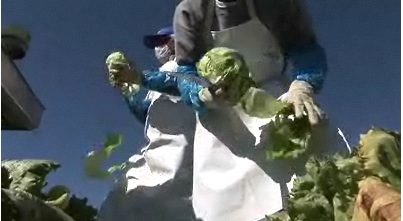The Dallas Morning News ran a couple of excellent features on the flow of food from Mexico to the U.S. Yesterday’s story was about the lack of inspectors, how little product was actually inspected, and, perhaps unwittingly, the problem of inspecting fresh produce for microbial contaminants.
“In December, officials took a sample for testing from a 5,500-pound load of Mexican basil moving through the Otay Mesa border crossing in San Diego. The basil continued on to its destination and was sold to restaurants and other customers in California, Texas and Illinois the next day. When the test results came back two weeks later, they suggested salmonella contamination, sparking a late recall.”
It’s much better to design safety into all operations, beginning on the farm.
 Glenn Fry helps run Taylor Farms de Mexico’s new $14 million plant in San José Iturbide, Mexico. He picked the land where it sits, designed just about every facet of it, and he manages more than 800 workers who plant, harvest and package produce – including lettuce, onions and broccoli – for export to the U.S.
Glenn Fry helps run Taylor Farms de Mexico’s new $14 million plant in San José Iturbide, Mexico. He picked the land where it sits, designed just about every facet of it, and he manages more than 800 workers who plant, harvest and package produce – including lettuce, onions and broccoli – for export to the U.S.
Today’s story says that Taylor Farms is just one of a handful of U.S. companies lured by Mexico’s ideal year-round growing climate, proximity to Texas, low labor costs and plentiful workforce.
During a recent lettuce harvest, quality-control supervisor Laura Patino pointed to an aide who monitors workers coming out of the mobile toilets at the end of the fields to make sure they wash their hands before returning to work.
"Many of our workers don’t even have toilets at home, so this is new to them," Ms. Patino explains. "We’ve literally taught many of them how to go to the restroom. It’s that basic."
The lettuce field – owned by Oscar A. Bitar Macedo and leased by Taylor – is fenced off from outside "contamination." Heavy strips of yellow plastic keep out dogs, cattle and other livestock.
Mr. Bitar, owner of Rancho Don Alberto, leases all of his 100 hectares (about 247 acres) to Taylor. And he’s responsible for maintenance, water wells, monthly water testing, fencing, security guards and, yes, even toilet paper. …
Within two hours, 24 boxes, each holding about 850 pounds of lettuce, are transported to Taylor’s plant a few miles down the road for the first of several safety checks.
At the entrance, 19-year-old Efigenia Rosas checks the boxes to make sure they’re labeled with bar codes identifying the owner’s farm, crew supervisor, field and time of harvest – a crucial step in the process. If a consumer later finds a problem, Taylor can trace the produce back to the field and farmer. …
At 6 p.m., driver Roman Ayala, an employee of Flensa Trucking, begins the drive north on Mexico’s Highway 57. He’s in no rush because he has no chance of getting to Nuevo Laredo before Customs shuts down the bridge at 11 p.m. And it won’t reopen until 8 a.m., something that frustrates Mr. Fry to no end.
"How can the U.S. government be serious about food safety when they shut down the border overnight and perishable goods have to sit there and wait?" he asks.
There is also a good video overview of the lettuce harvesting procedures available along with the story at http://www.dallasnews.com/sharedcontent/dws/news/world/mexico/stories/063008dningproducttaylor.40d72a3.html
